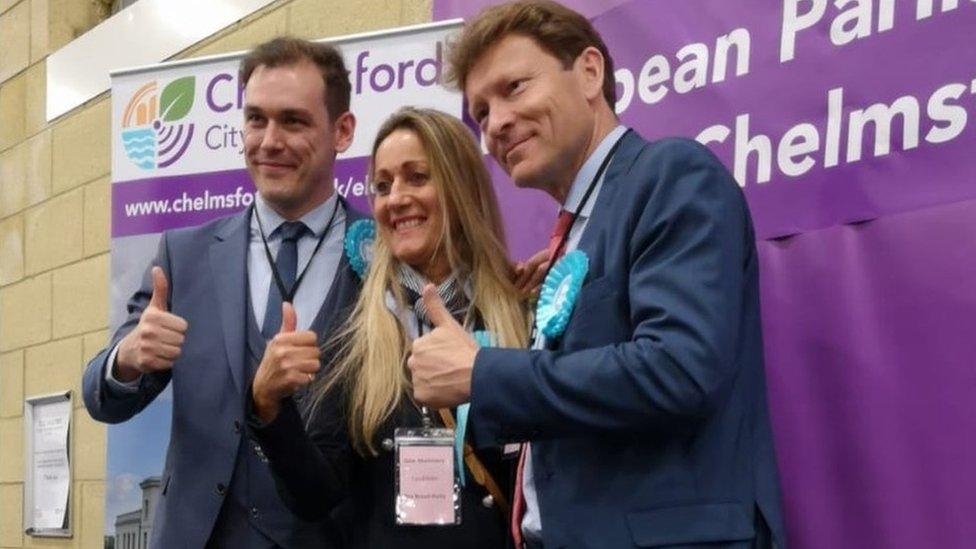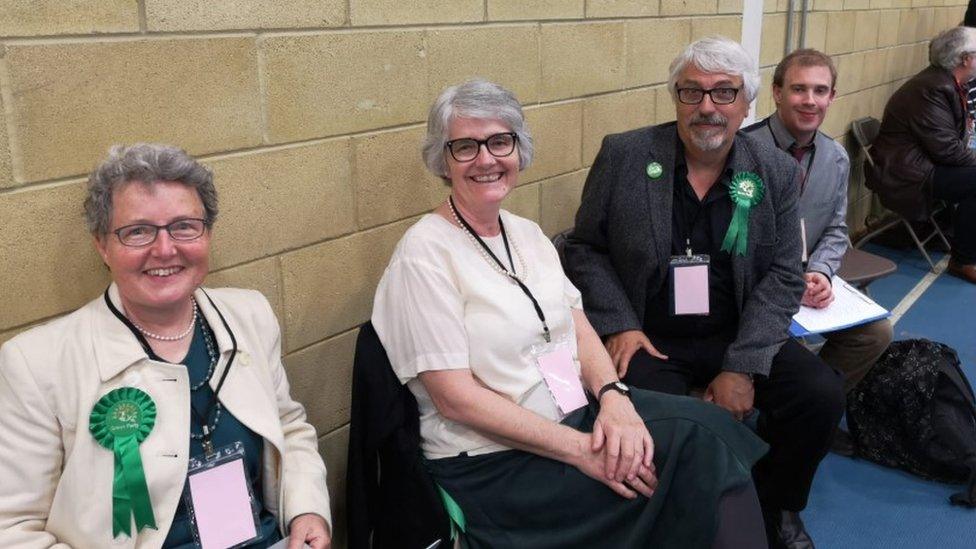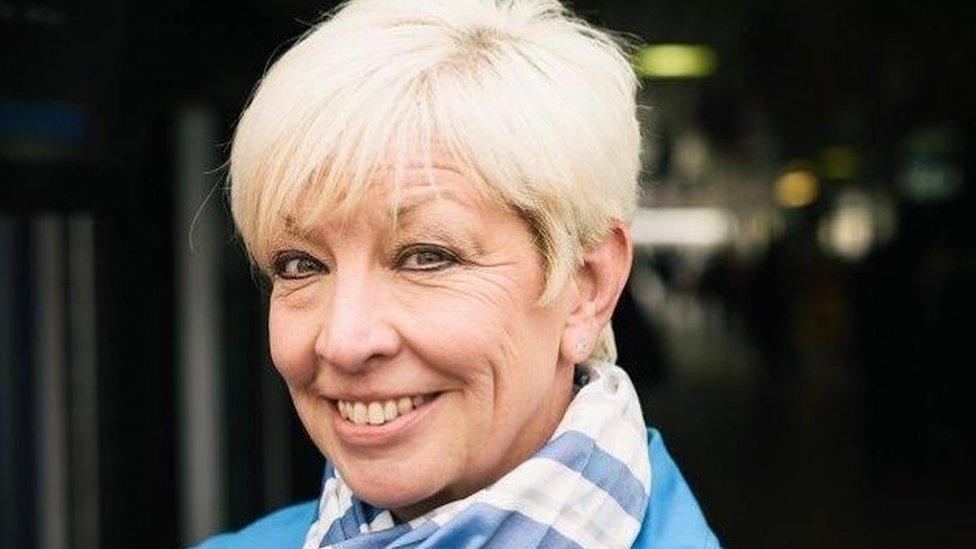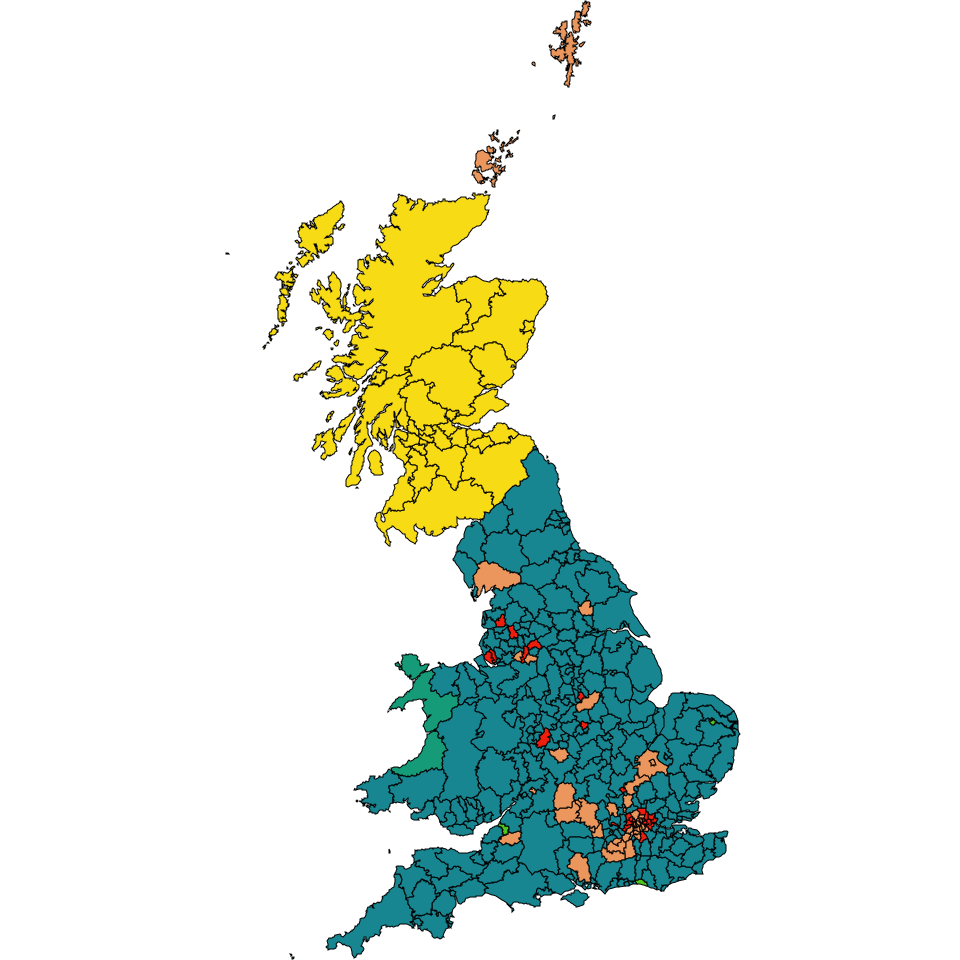European elections 2019: Brexit Party wins three East seats
- Published

Brexit Party candidates Michael Heaver (left), June Mummer (centre) and Richard Tice (right) each won a seat
The Brexit Party was the big winner in the European Elections in the East of England, with three MEPs elected.
The party received 38% of the vote with 604,715. The Lib Dems, which secured two MEPs, took 22.6% and the Green Party - which won one seat - 12.7%.
The Tories' share was down 18.1% to 10.2%. Labour was down 8.5% to 8.7%, placing the party in fifth place.
Brexit Party MEP Richard Tice said the party now needed "to play a significant role in the negotiations".

Winning Green Party candidate Catherine Rowett, closest to the camera, said the vote backed environmental protection
The Brexit Party took three of the region's seven MEP seats, with the Lib Dems taking two seats and the Greens and Conservatives, one apiece.
One of the winning Brexit Party candidates, Richard Tice, said: "People are voting for change. People want politics done in a different way. People are rejecting the idea that any deal is better than a no deal."
Mr Tice, who is chairman of the party, said: "We need strong, bold leadership and we need the Brexit Party MEPs to play a significant role in the negotiations."
Winning Lib Dem candidate Barbara Gibson said: "I think it is clear to everyone that Westminster politics has failed us.
"Both Theresa May and Jeremy Corbyn with their fingers in their ears and refusing to listen to the message of the electorate. There is nothing more democratic than to put it back to the people."

One of the winning Lib Dem candidates Barbara Gibson said people had been failed by Westminster politics
Catherine Rowett, the newly elected Green MEP, said: "People have voted against old politics. Many people have voted for the Green Party for the first time. They have signalled a commitment to place environmental protection at the top of the agenda."
The winning Conservative candidate Geoffrey Van Orden said it was an "election that was never supposed to happen" and the government needs to be "strong on Europe and tough with Brussels".

Analysis
By Andrew Sinclair, political correspondent, BBC Look East
Both the Brexit Party and the Liberal Democrats had very different but simple messages on Brexit, and it worked.
A party which is just a few weeks old has topped the poll in the east of England. A party which lost its seat last time around now has two.
While the Greens, so close to success in previous elections, have stormed into third place.
And the two main parties, unclear about how to deliver Brexit, were both humiliated.
If you tot up all the votes you could argue that more people voted for pro-Brexit parties in the east. But the number of people voting for anti-Brexit parties almost trebled.
We are still a Euro-sceptic region, but public opinion is changing.

Chris Vince, one of the candidates for Labour - which lost MEP Alex Mayer in the election - said it was "always going to be difficult for Labour as it has become an informal referendum".
He said the vote was a "real rejection of the Tories with the vote massively down" and the support for the Greens and Lib Dems was because they offered "simple solutions to something which is complex".
UKIP MEP Stuart Agnew, who lost his seat, said the loss was "not unexpected and the important thing was the leave vote was very strong and in the East quite emphatic".
He said he had not jumped ship to join the Brexit Party because he believed in the UKIP leader's "concern about creeping Islamification" of the country.
Neil Carmichael, of Change UK, said: "We are just starting out as a party. We have made a big step in the right direction."
He said it was wrong to compare Change UK to the Brexit Party as Nigel Farage also had an "army" of supporters from his time leading UKIP.
He said it was clear there was "an appetite for a second referendum".
At the last EU election UKIP topped the poll, Conservatives were second, Labour third, the Green Party fourth and the Lib Dems came fifth.
Change UK had 3.6% of the vote in the East, while UKIP was down 31.1% to 3.4% of the vote.
Turnout for European elections in the East was 36.37% of the electorate with 1,603,017 votes cast.
The total size of the electorate was 4,407,975.
The results were announced in Chelmsford.
